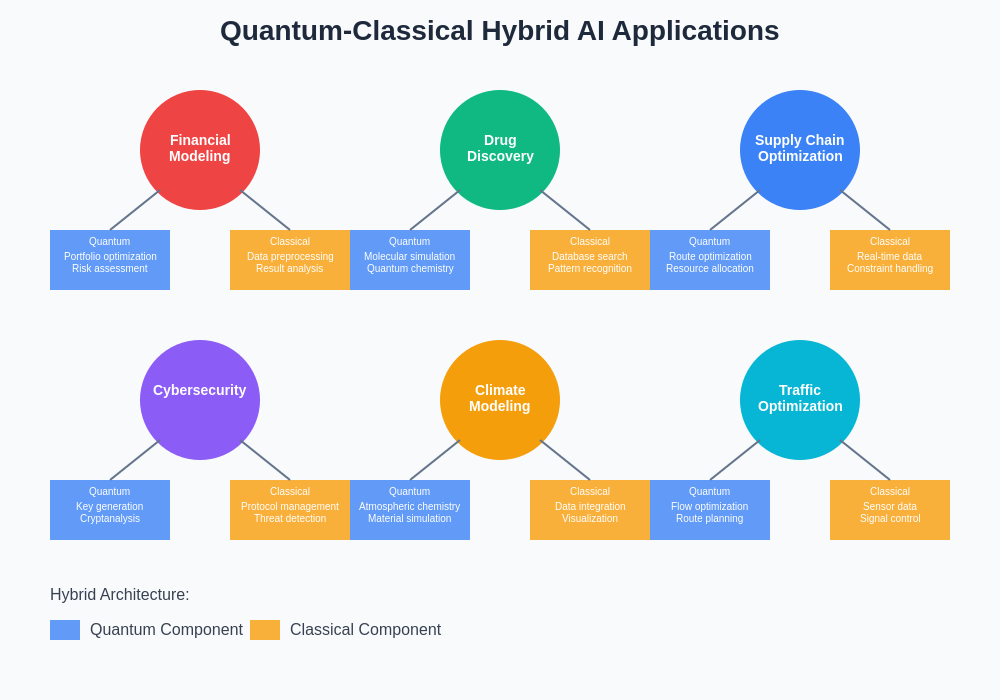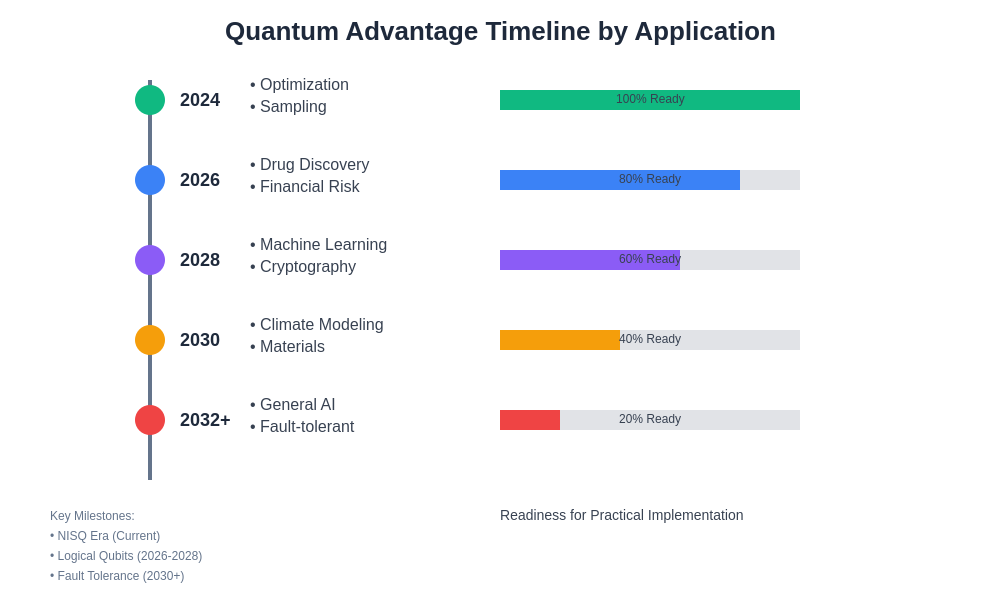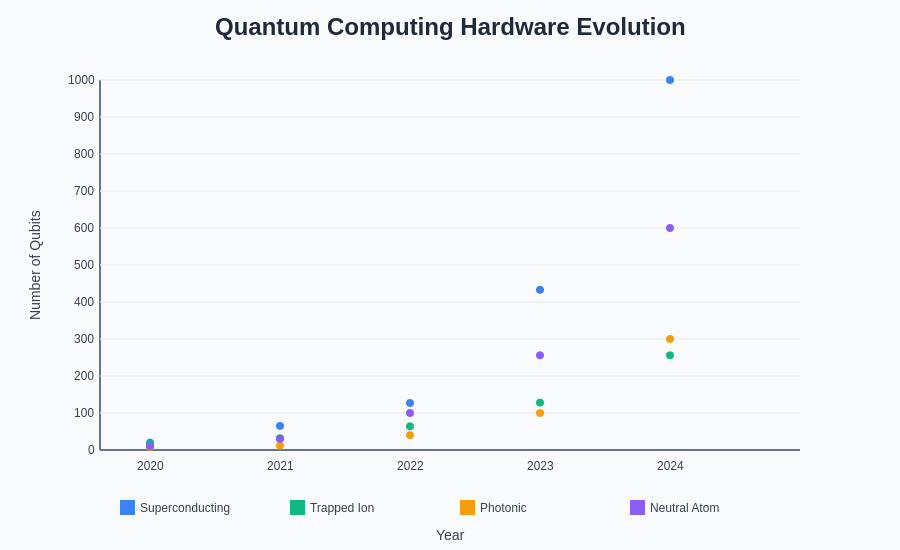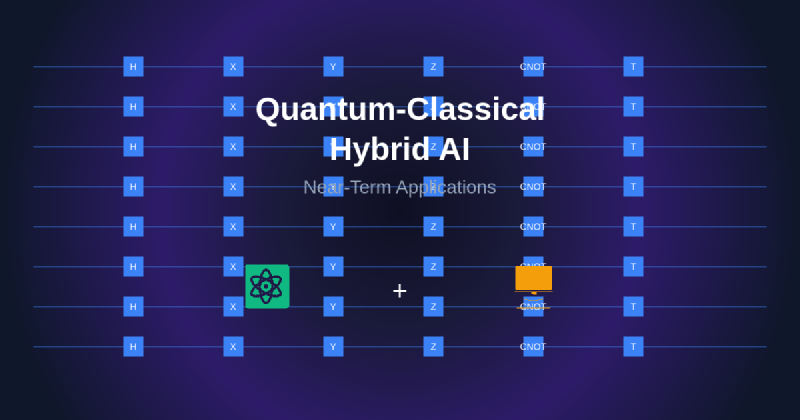The convergence of quantum computing and artificial intelligence represents one of the most exciting frontiers in modern technology, promising to unlock computational capabilities that were previously confined to the realm of theoretical physics. Quantum-classical hybrid artificial intelligence systems are emerging as the most pragmatic approach to harnessing quantum advantages in the near term, combining the strengths of both quantum and classical computing architectures to solve complex problems that neither could tackle alone effectively.
Explore the latest developments in AI and quantum computing to stay informed about breakthrough research and practical implementations that are shaping the future of computational intelligence. The integration of quantum computing principles with classical AI methodologies is not merely an academic exercise but a practical necessity for addressing the computational limitations that current classical systems face when dealing with exponentially complex problems.
Understanding Quantum-Classical Hybrid Architecture
The fundamental premise of quantum-classical hybrid AI lies in the strategic division of computational tasks between quantum processors and classical computers, leveraging each system’s strengths while mitigating their respective weaknesses. Quantum processors excel at exploring vast solution spaces simultaneously through superposition and entanglement, making them particularly suited for optimization problems, pattern recognition in high-dimensional spaces, and certain types of machine learning algorithms that benefit from quantum parallelism.
Classical computers, with their mature error correction mechanisms, extensive software ecosystems, and reliable performance characteristics, handle preprocessing of data, parameter optimization, result interpretation, and the coordination of the overall computational workflow. This symbiotic relationship allows researchers and practitioners to extract quantum advantages even from current noisy intermediate-scale quantum devices while maintaining the practical reliability necessary for real-world applications.
The hybrid approach is particularly compelling because it acknowledges the current limitations of quantum hardware, including limited coherence times, high error rates, and restricted gate fidelities, while still enabling the exploration of quantum computational advantages in specific problem domains where quantum algorithms can demonstrate clear superiority over their classical counterparts.
Quantum Machine Learning in Financial Modeling
Financial institutions have emerged as early adopters of quantum-classical hybrid AI systems, particularly in areas such as portfolio optimization, risk assessment, and fraud detection where the complexity of the problem space often exceeds the capabilities of classical algorithms. Quantum machine learning algorithms can process multiple market scenarios simultaneously, enabling more sophisticated risk modeling and portfolio optimization strategies that account for complex interdependencies between financial instruments and market conditions.
Experience advanced AI capabilities with Claude for complex analysis and reasoning tasks that complement quantum computing research and development. The integration of quantum algorithms with classical machine learning frameworks has shown particular promise in Monte Carlo simulations for derivative pricing, where quantum amplitude estimation can provide quadratic speedups over classical approaches for certain classes of problems.
Risk assessment models benefit significantly from quantum machine learning approaches because they can naturally handle the probabilistic nature of financial markets through quantum superposition states. Hybrid systems can process vast amounts of historical market data using classical preprocessing while leveraging quantum algorithms to identify subtle patterns and correlations that might be invisible to traditional analytical methods, resulting in more accurate risk predictions and better-informed investment strategies.
Drug Discovery and Molecular Simulation
The pharmaceutical industry represents another domain where quantum-classical hybrid AI is demonstrating substantial potential for near-term impact. Molecular simulation and drug discovery processes involve quantum mechanical phenomena at their core, making them natural candidates for quantum computing applications. Hybrid AI systems can model molecular interactions, predict drug-target binding affinities, and optimize lead compounds with unprecedented accuracy and efficiency.
Classical computers handle the vast databases of molecular structures, experimental results, and biological pathways, while quantum processors simulate the quantum mechanical behavior of electrons in molecular systems. This division of labor enables researchers to explore much larger chemical spaces and identify promising drug candidates more efficiently than traditional computational chemistry approaches, potentially reducing the time and cost associated with bringing new medications to market.
The ability to accurately simulate quantum effects in biological systems has profound implications for personalized medicine, where quantum-classical hybrid AI systems can model how individual genetic variations affect drug metabolism and efficacy. These capabilities are particularly valuable in oncology research, where the complex interactions between cancer cells, therapeutic agents, and healthy tissue require sophisticated modeling approaches that can account for quantum mechanical effects at the molecular level.
Optimization in Supply Chain and Logistics
Supply chain optimization represents one of the most commercially viable near-term applications of quantum-classical hybrid AI, where the combinatorial complexity of routing, scheduling, and resource allocation problems often overwhelms classical optimization algorithms. Quantum annealing and variational quantum eigensolvers can explore vast solution spaces more efficiently than classical methods, leading to significant improvements in operational efficiency and cost reduction.
Hybrid systems excel at handling dynamic supply chain optimization problems where multiple constraints must be satisfied simultaneously, such as minimizing transportation costs while ensuring timely delivery, managing inventory levels, and adapting to supply disruptions. The quantum component can rapidly explore alternative routing strategies and resource allocations, while the classical system manages real-time data integration, constraint validation, and implementation of the optimized solutions.
The scalability advantages of quantum algorithms become particularly apparent in global supply chain networks where the number of possible configurations grows exponentially with the number of suppliers, distribution centers, and customers. Hybrid AI systems can process these complex optimization problems in near real-time, enabling companies to respond more effectively to market changes, supply disruptions, and demand fluctuations while maintaining optimal operational efficiency.

The diverse applications of quantum-classical hybrid AI span multiple industries and problem domains, each leveraging the unique advantages of quantum processing for specific computational tasks while relying on classical systems for data management, preprocessing, and result interpretation.
Cybersecurity and Cryptographic Applications
The intersection of quantum computing and cybersecurity presents both opportunities and challenges that quantum-classical hybrid AI systems are uniquely positioned to address. While quantum computers pose potential threats to current cryptographic systems, hybrid AI approaches are being developed to enhance security measures and create quantum-resistant cryptographic protocols that can withstand attacks from both classical and quantum adversaries.
Hybrid systems can implement post-quantum cryptography algorithms that combine classical cryptographic techniques with quantum key distribution protocols, creating communication channels that are theoretically secure against any computational attack. These systems use quantum processors to generate truly random cryptographic keys and detect eavesdropping attempts, while classical computers handle the encryption, decryption, and key management processes.
Discover comprehensive AI research capabilities with Perplexity for in-depth analysis of quantum cryptography and security protocols that are shaping the future of digital communication. The development of quantum-resistant authentication systems represents a critical near-term application where hybrid AI can provide enhanced security without requiring a complete overhaul of existing infrastructure.
Traffic Flow Optimization and Smart Cities
Urban planning and traffic management represent emerging applications where quantum-classical hybrid AI systems are beginning to demonstrate practical value in addressing the complex optimization challenges associated with modern metropolitan areas. Traffic flow optimization involves simultaneous consideration of multiple variables including vehicle routing, signal timing, pedestrian flow, public transportation scheduling, and emergency response coordination, creating combinatorial problems that benefit significantly from quantum processing capabilities.
Hybrid AI systems can process real-time traffic data from thousands of sensors, cameras, and connected vehicles while using quantum algorithms to identify optimal routing strategies that minimize congestion, reduce emissions, and improve overall transportation efficiency. The quantum component excels at exploring multiple traffic flow scenarios simultaneously, while classical systems handle data integration, user interface management, and implementation of traffic control measures.
Smart city applications extend beyond traffic management to include energy grid optimization, waste management routing, and resource allocation problems that require coordination across multiple municipal systems. Hybrid AI approaches enable city planners and administrators to optimize these interconnected systems holistically rather than addressing each component in isolation, leading to more efficient and sustainable urban environments.
Climate Modeling and Environmental Applications
Climate science and environmental modeling represent perhaps one of the most important long-term applications of quantum-classical hybrid AI, where the complexity of atmospheric, oceanic, and ecological systems requires computational approaches that can handle massive datasets while modeling quantum mechanical processes that occur at molecular and atomic scales. Hybrid systems can simulate complex chemical reactions in the atmosphere, model cloud formation processes, and predict the effects of various intervention strategies on global climate patterns.
The quantum component of hybrid AI systems excels at modeling the quantum mechanical aspects of photosynthesis, atmospheric chemistry, and material properties that are crucial for developing new technologies such as more efficient solar cells, carbon capture systems, and sustainable materials. Classical computers handle the vast amounts of observational data, coordinate the integration of multiple climate models, and provide the computational infrastructure necessary for long-term climate projections.
These capabilities are particularly valuable for developing and evaluating carbon capture technologies, renewable energy systems, and environmental remediation strategies where understanding the fundamental quantum mechanical processes is essential for optimization and innovation. Hybrid AI systems can accelerate the development of new materials and technologies that could play crucial roles in addressing climate change and environmental degradation.

The timeline for achieving practical quantum advantages in various application domains reflects the current state of quantum hardware development and the complexity of different problem classes, with optimization and simulation applications showing the most near-term promise.
Challenges and Current Limitations
Despite the promising potential of quantum-classical hybrid AI systems, several significant challenges must be addressed to realize their full commercial and scientific potential. Quantum hardware limitations including short coherence times, high error rates, and limited connectivity between qubits constrain the complexity and duration of quantum computations that can be performed reliably. These limitations require careful algorithm design and error mitigation strategies that can extract meaningful results from noisy quantum devices.
The integration of quantum and classical computing systems presents significant engineering challenges related to latency, data transfer, and synchronization between different computational architectures. Hybrid algorithms must be designed to minimize the communication overhead between quantum and classical components while maximizing the quantum advantage for specific problem components. This requires sophisticated software frameworks and middleware that can efficiently coordinate the execution of hybrid algorithms across heterogeneous computing platforms.
Talent scarcity represents another significant barrier to widespread adoption of quantum-classical hybrid AI systems, as the field requires expertise in quantum physics, computer science, and domain-specific applications. Educational institutions and industry organizations are working to develop curriculum and training programs that can prepare the next generation of quantum computing professionals, but the current shortage of qualified practitioners limits the pace of development and deployment of hybrid AI systems.
Software Development and Programming Frameworks
The development of robust software frameworks and programming tools represents a critical factor in the practical deployment of quantum-classical hybrid AI systems. Current quantum programming languages and development environments are rapidly evolving to support hybrid algorithm development, with frameworks such as Qiskit, Cirq, and PennyLane providing increasingly sophisticated tools for designing and implementing hybrid algorithms across different quantum hardware platforms.
These frameworks abstract many of the low-level details of quantum hardware management while providing high-level interfaces that enable developers to focus on algorithm design and optimization rather than hardware-specific implementation details. The integration with classical machine learning libraries such as TensorFlow and PyTorch enables seamless development of hybrid algorithms that can leverage existing classical AI expertise while incorporating quantum advantages where appropriate.
Version control, testing, and deployment pipelines for hybrid AI systems require specialized tools and methodologies that can handle the unique characteristics of quantum algorithms including probabilistic outputs, hardware-specific optimizations, and noise mitigation strategies. The development of robust software engineering practices for quantum computing is essential for the reliable deployment of hybrid AI systems in production environments.
Hardware Development and Scaling
The continued advancement of quantum hardware capabilities remains fundamental to the long-term success of quantum-classical hybrid AI applications. Current noisy intermediate-scale quantum devices provide sufficient capabilities for proof-of-concept demonstrations and limited commercial applications, but scaling to more complex problems requires improvements in qubit count, coherence times, gate fidelities, and connectivity between qubits.
Different quantum computing technologies including superconducting circuits, trapped ions, photonic systems, and neutral atoms each offer unique advantages and limitations for hybrid AI applications. The diversity of hardware approaches provides multiple pathways for achieving quantum advantages in different application domains, with some technologies being better suited for optimization problems while others excel at simulation tasks or quantum machine learning applications.
Error correction and fault tolerance represent perhaps the most significant long-term challenges for quantum computing hardware, as most practical applications of quantum-classical hybrid AI will ultimately require error-corrected quantum computers to achieve their full potential. The development of efficient error correction codes and fault-tolerant quantum algorithms is essential for scaling hybrid AI systems to solve industrially relevant problems that exceed the capabilities of current classical computers.

The evolution of quantum computing hardware demonstrates steady progress across multiple technology platforms, with each approach offering unique advantages for different classes of hybrid AI applications and showing promising trajectories toward achieving practical quantum advantages.
Industry Adoption and Commercial Viability
The commercial adoption of quantum-classical hybrid AI systems is accelerating across multiple industries, driven by the potential for significant competitive advantages in optimization, simulation, and machine learning applications. Early adopters in finance, pharmaceuticals, logistics, and cybersecurity are investing heavily in hybrid AI research and development, recognizing that quantum advantages in these domains could provide substantial business value even with current hardware limitations.
Technology companies are developing cloud-based quantum computing services that make hybrid AI capabilities accessible to organizations without requiring significant investments in quantum hardware infrastructure. These platforms enable businesses to experiment with hybrid algorithms, evaluate their potential benefits for specific use cases, and gradually integrate quantum computing capabilities into their existing workflows and business processes.
The development of quantum computing ecosystems including hardware vendors, software companies, consulting services, and educational institutions is creating a supportive environment for commercial adoption of hybrid AI technologies. Partnerships between quantum computing companies and traditional technology providers are accelerating the integration of quantum capabilities into existing software platforms and business applications.
Future Implications and Research Directions
The trajectory of quantum-classical hybrid AI development points toward increasingly sophisticated applications that could fundamentally transform how we approach complex computational problems across multiple domains. Research directions include the development of quantum neural networks, quantum reinforcement learning algorithms, and hybrid optimization methods that can adapt dynamically to problem characteristics and hardware capabilities.
The potential integration of hybrid AI systems with other emerging technologies such as advanced materials, biotechnology, and renewable energy creates opportunities for addressing some of the most pressing challenges facing humanity including climate change, disease treatment, and sustainable development. These interdisciplinary applications require collaboration between quantum computing researchers, domain experts, and technology developers to realize their full potential.
Long-term research goals include the development of quantum-classical hybrid AI systems that can operate autonomously, adapting their quantum and classical components dynamically based on problem characteristics, hardware availability, and performance requirements. This level of sophistication would enable hybrid AI systems to serve as general-purpose computational tools that could be applied across diverse problem domains without requiring specialized expertise in quantum computing.
The continued advancement of quantum-classical hybrid AI represents not just a technological evolution but a fundamental shift in how we conceptualize and approach complex computational challenges. As these systems mature and become more accessible, they promise to unlock new frontiers in scientific discovery, technological innovation, and problem-solving capabilities that could benefit society as a whole while addressing some of the most significant challenges of our time.
Disclaimer
This article is for informational purposes only and does not constitute professional advice. The views expressed are based on current understanding of quantum computing and artificial intelligence technologies. Readers should conduct their own research and consult with qualified experts when considering the implementation of quantum-classical hybrid AI systems. The rapidly evolving nature of quantum computing technology means that specific technical details and capabilities may change as the field continues to advance.
